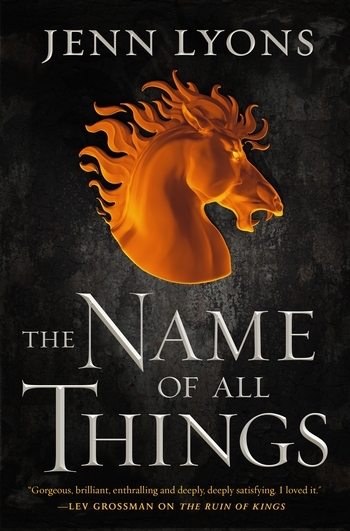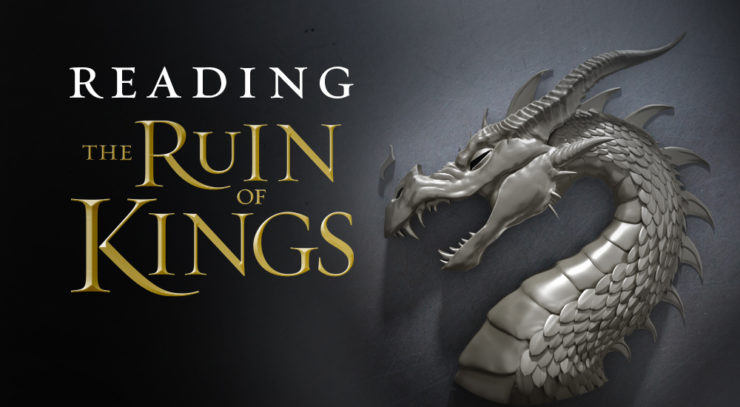I never really cared until I met you, Tor.com! Have a post in token of how I Heart you!
This blog series will be covering The Ruin of Kings, the first novel of a five-book series by Jenn Lyons. Previous entries can be found here in the series index.
Today’s post will be covering Chapter 60, “The Invitation”, and Chapter 61, “Guardians of the Cage.” Please note that from this point forward, these posts will likely contain spoilers for the entire novel, so it’s recommended that you read the whole thing first before continuing on.
Got that? Great! Click on for the rest!
Chapter 60: The Invitation (Talon’s story)
[In which Galen and Kihrin hear an unexpected conversation they probably shouldn’t, and receive an unexpected warning they definitely should.]
So You’re Summoning A Demon; ask Darzin how!
At this point in the story the reader has more than enough information to connect the “dead” voice in this chapter to Gadrith the Twisted, but I’m not sure I would have been able to identify the third voice in the dungeon with Gadrith and Darzin yet, on first read. Of course, I’m still not sure now, but I think he’s none other than our very own narrator Thurvishar.
Buy the Book


The Name of All Things
The only reason I’m not more sure is that Gadrith talks to the third voice about this dungeon being “where his parents met”, and that third voice’s mother was a to-be sacrifice that third voice’s father Sandus rescued there. And I’m kiiiind of under the impression that Thurvishar is Gadrith’s son? But maybe not; he could be adopted, or something. Or I’m totally wrong and the third voice is someone else entirely. Whatever, we’ll find out eventually. But we should probably have our interest very piqued that future Emperor of Everything (or at least Quur) Sandus was at one point rescuing damsels in demon-sacrificing distress from Kihrin’s family. Hmmm.
Growing up as royalty can be an excruciatingly lonely existence, especially for a child in line to inherit. Every child from a rival family is assumed to be some sort of saboteur or spy, and every child from inside the family is a potential rival. Some families purchase companion slaves for their children, but such a relationship can hardly be a healthy one.
This is a perhaps overused trope in fantasy, and one with more than a faint flavor of classism to it, like, oh, how sad that you are lonely in your gilded bower of plenty while peasant children are literally starving to death half a mile from your castle, poor baby. That said, from a psychological point of view, growing up the way Thurvishar describes cannot be anything but exceptionally toxic and damaging to a child’s mental development and socialization skills, and it bodes ill for the future of any nation destined to be ruled by children who are taught distrust, deceit and manipulation from the cradle. Thank dog nothing like that ever happens in the real world!!! Wheee yeah
Chapter 61: Guardians of the Cage (Kihrin’s story)
[In which divine shit gets real, and Relos Var takes a level in badass he didn’t even need.]
So what’s basically established in this chapter is: Relos Var ain’t just some magician, but something powerful enough to be fairly confident in taking on the Head Goddesses in Charge (i.e. Tya, Thaena and Taja) when he’s in his happy doomsday place. And also something about how he created them, which, okay, wow. I sooort of remember that? Though I was under the impression it was much more of a mutual effort than Relos is making it out to be.
(Head Goddesses in Charge will also be the name of my Heart tribute band.)
Safe to say, when actual deities show up in person you know the fit has hit the shan. And even though we are soon to learn that ROK deities are slightly more non-traditional divine personifications of symbolic concepts than your average pantheon, that stills holds true. This is pretty much where the pace really begins picking up, and we’re finally getting some explanations about things, bit by bit. I’ll be quite pleased to be finally getting confirmation (or refutation) about the details I only half-remember when I first read this thing. Hopefully I’ll understand it better this time through, too.
“Tyentso, who are you talking about?” I’d have thought they meant Gadrith, except for the ‘father’ bit.
“Gadrith,” Tyentso said. “He means Gadrith.”
“Uh…no? Gadrith’s your husband,” I said.
“Yeah, he was that too.” She scowled. “Don’t look at me like that, Scamp. I wouldn’t have married him if he had any interest in sleeping with me. Or anyone, really.”
Whut. I’m pretty sure I missed this little detail entirely the first time around. Tyentso married her own father? The hell you say. That’s messed up, y’all. Why on earth?
Well, I guess I’ll find out. Yay?
Till then, I’ll always get by on my own, and if this song isn’t stuck in your head by now, I have failed in my duty. It chills me to the bone! Later!










